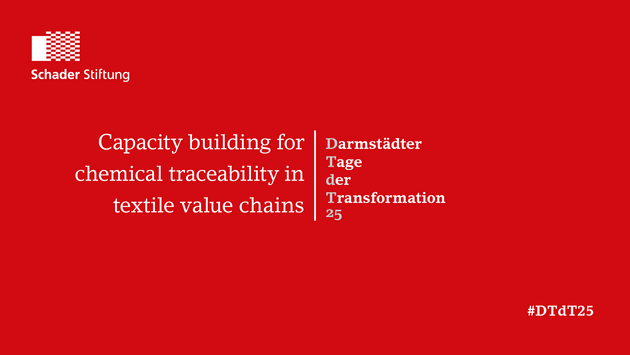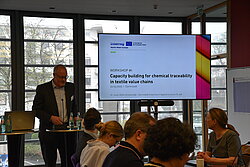Capacity building for chemical traceability in textile value chains
Artikel vom 18.11.2024

The transformation towards a resource-saving and low-emission circular economy presents companies - especially SMEs - with new challenges.
Beginn: 26.03.2025 | 10:00 Uhr
Ende: 26.03.2025 | 14:30 Uhr
Ort:
Schader-Forum
|
Goethestr. 2
|
64285 Darmstadt
|
Germany
In Google Maps öffnen
Capacity building among SMEs

Small and medium-sized enterprises (SME) face the challenge of ensuring the traceability of their products with regard to their suppliers and customers. They will be obliged to do this in the future due to the requirements adopted in the Green Deal. However, SMEs only have limited human resources; Their buyer power is also rather marginal. It is all the more important to initiate capacity building among SMEs, which enables them to deal with the challenges appropriately and at the same time exploit their specific strengths.
Sustainable Product Policies
The transformation towards a resource-conserving and non-toxic circular economy presents companies - especially SMEs - with new challenges. The EU Textile Strategy aims to tackle the high volume of waste with low recycling rates and negative environmental impacts of production. Sustainable Product Policies prioritize these product groups for new Ecodesign requirements (incl. Digital Product Passport). These measures require that stakeholders have access to detailed product information. Traceability of chemicals is an important prerequisite for CE-compliant products and business models. The workshop addressed this politically highly topical and environmentally pressing issue through concrete recommendations for action and capacity building.
The ECHT project

Based on the insights and findings of the ongoing European research project on traceability of chemicals in global textile value chains (ECHT project) this workshop aimed at building capacity to implement traceability in companies (incl. SMEs) along the overall textile value chain. This was done from a more strategic and conceptual point of view, remaining technology neutral. While, technology is one key aspect for the successful implementation of traceability, the actual challenges lie in the proper structural implementation of technologies rather than in the technology itself. Collaboration along the value chain, the development of viable business models and an understanding of the regulatory framework are among other aspects key drivers – especially for SMEs – to benefit from traceability beyond mere regulatory compliance.
Workshop in Darmstadt
In this workshop, stakeholders from the textile value chains (e.g. producers of fabrics and dyes, brands, retailers, recyclers) received input from academia, NGOs and industry, illustrating conceptual knowledge and best practice examples (incl. from other sectors). In several co-creative working sessions, participants generated further insights and knowledge on how to overcome barriers to traceability.
Participants were also introduced to the “ECHT Knowledge Platform”, an online repository and educational tool for industry and policy actors. They were given access to materials and know-how that they can directly apply, implement and disseminate within their own organisations.
Beyond this workshop, further follow-up workshops are planned to deepen the knowledge and revisit the elements that have been covered in this workshop.
Participation was possible in person or online.
Darmstadt Days of Transformation #DTdT25
For more information about the ECHT project visit https://echt.nweurope.eu/ or get in contact with the project team: echt(at)h-da.de / jonas.rehn(at)h-da.de
We're happy to work again with Dr. Jonas Rehn-Groenendijk and his team from Hochschule Darmstadt (University of Applied Sciences).
The conference was a cooperation with Darmstadt University of Applied Sciences and took place as part of the Darmstadt Days of Transformation 2025 (DTdT25).
Contact person for the Schader Foundation: Alexander Gemeinhardt
Aktuelle Veranstaltungen



